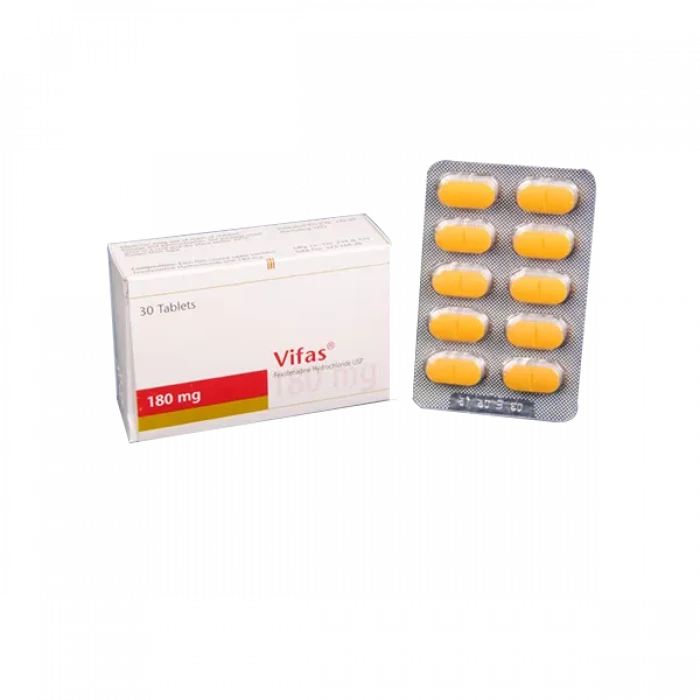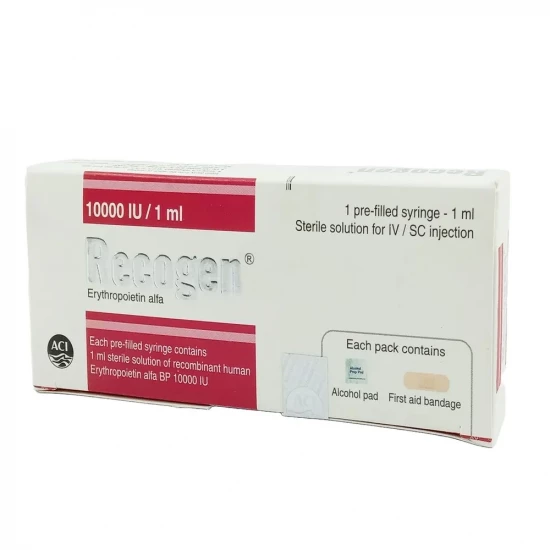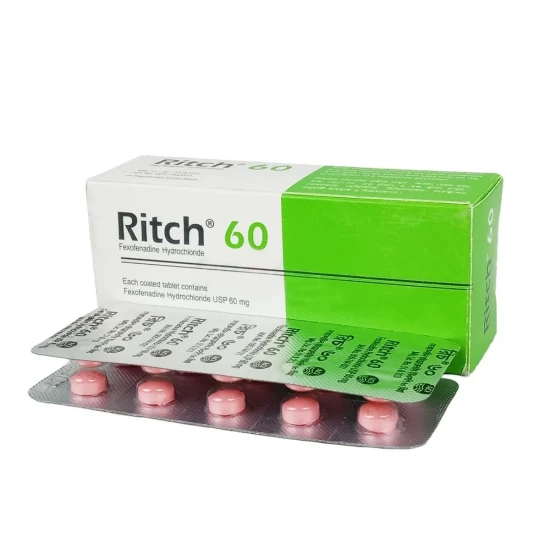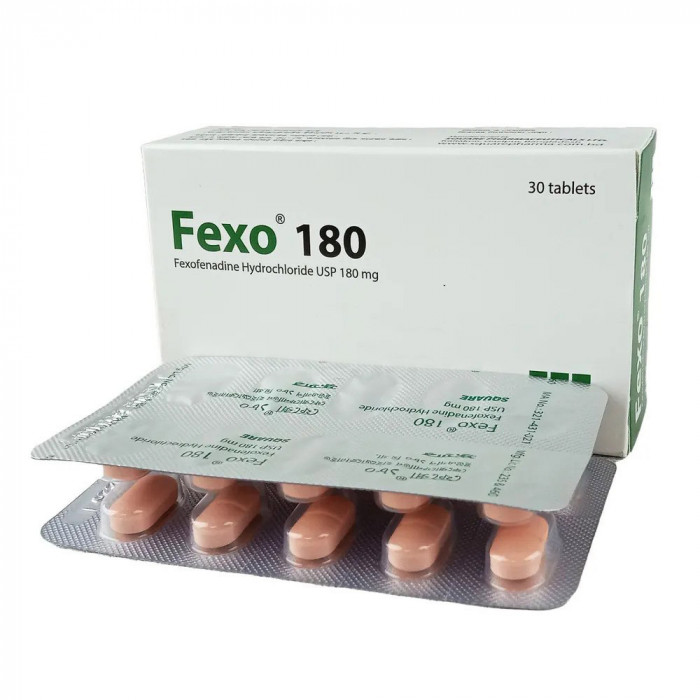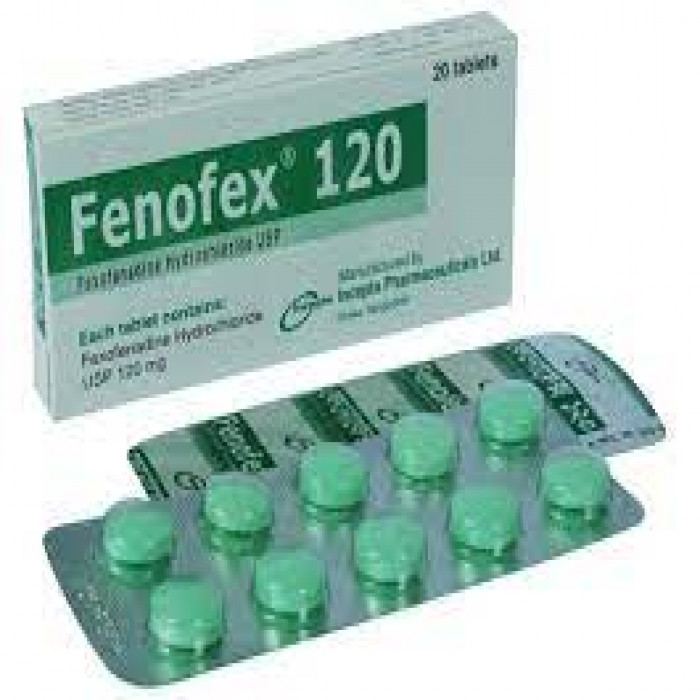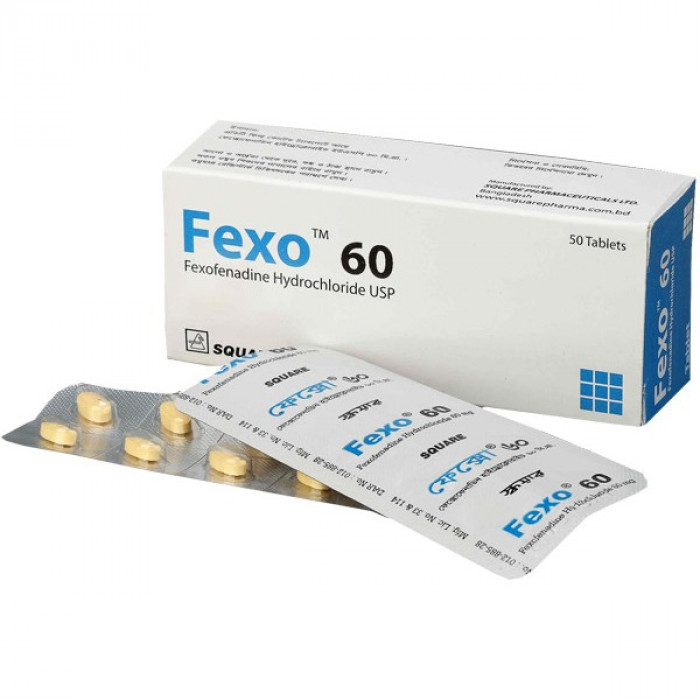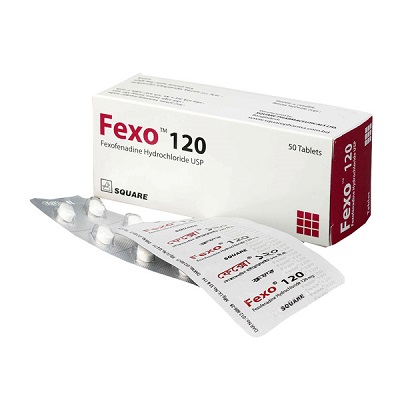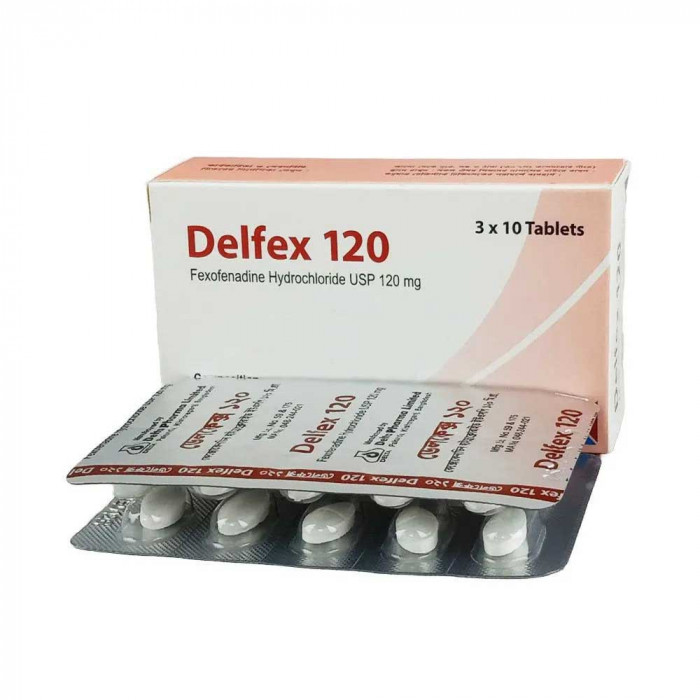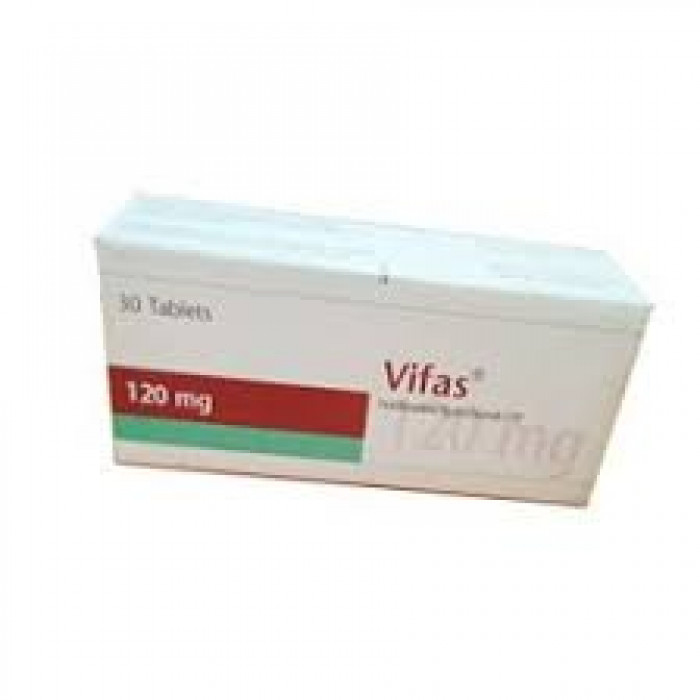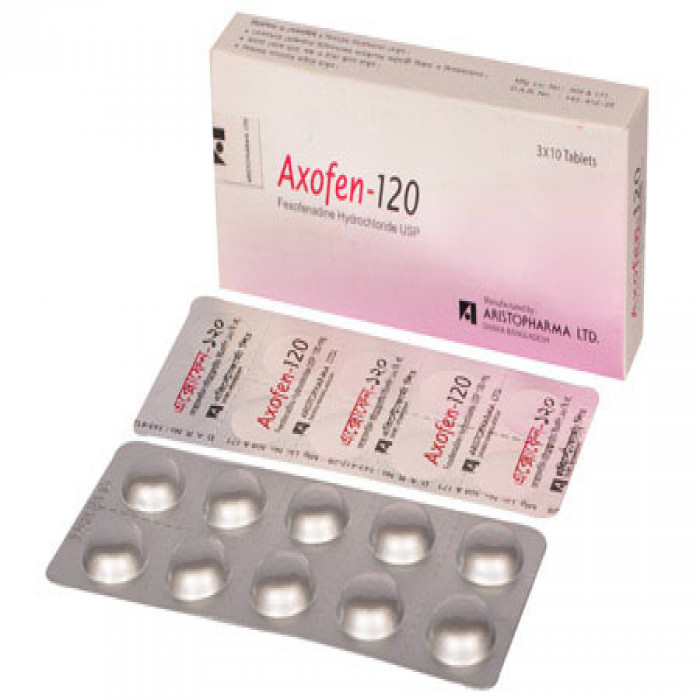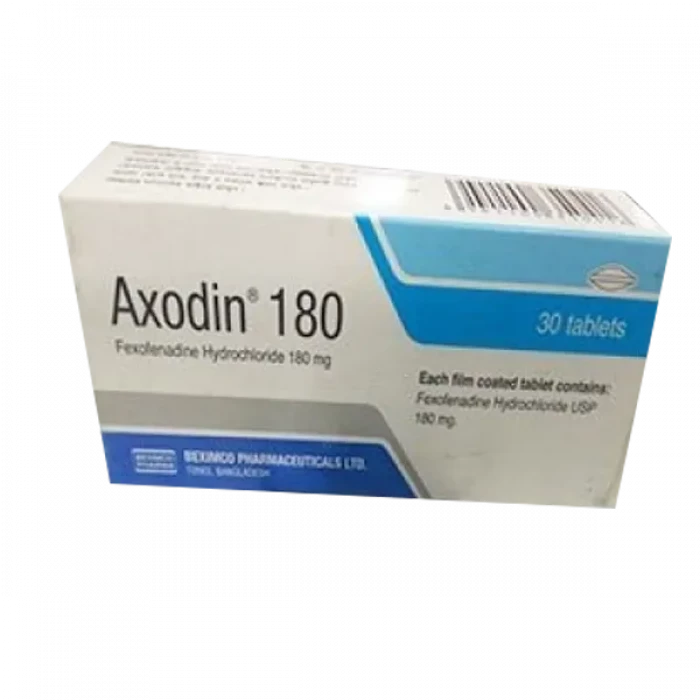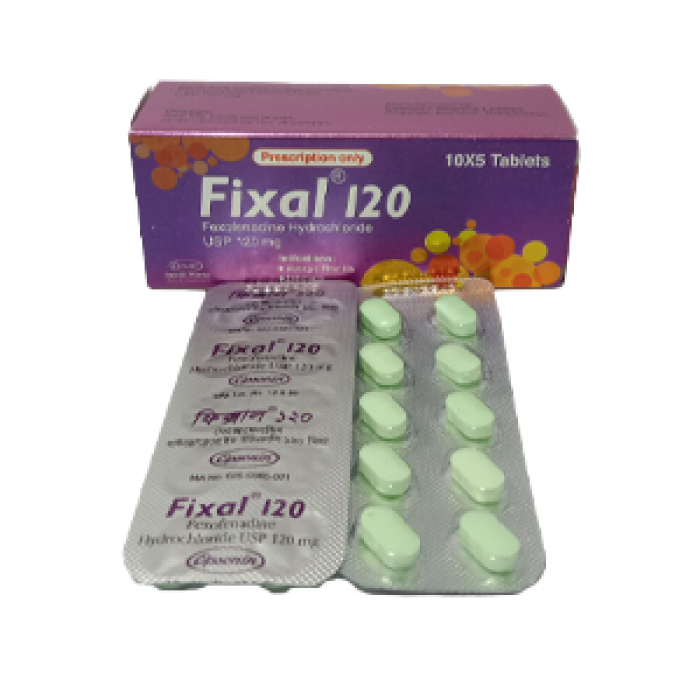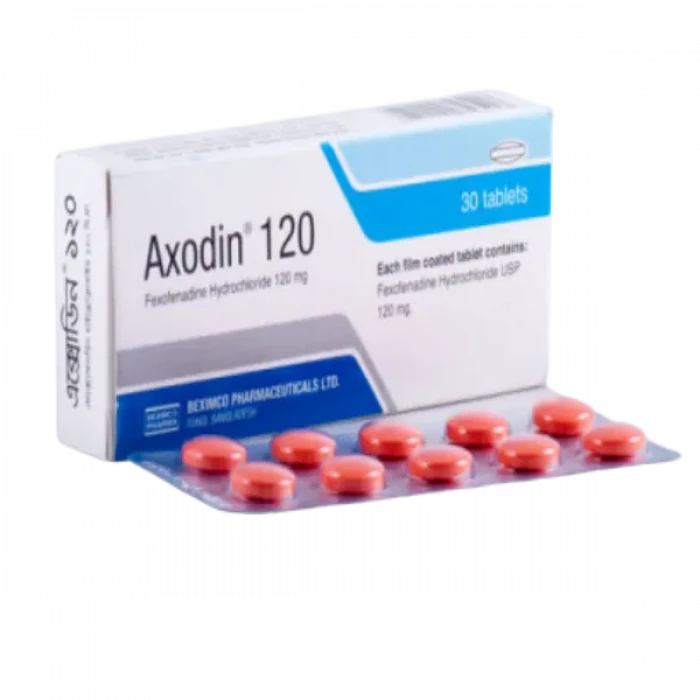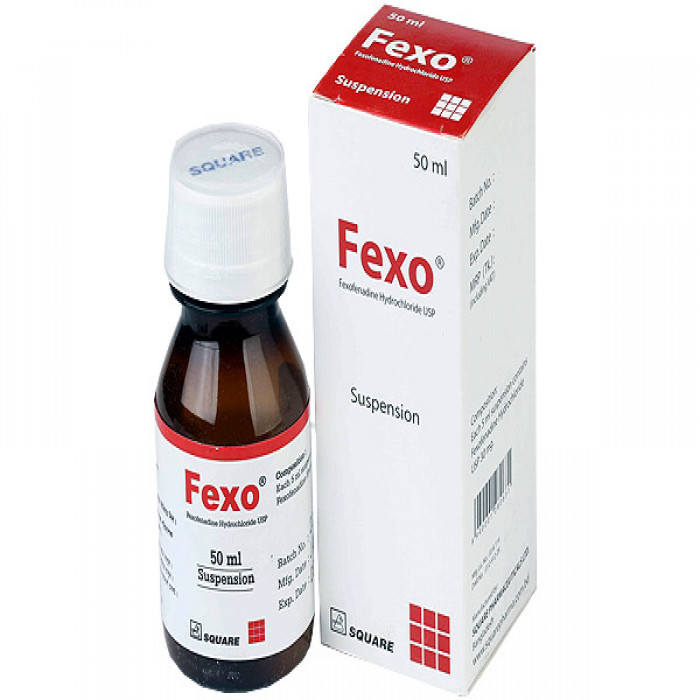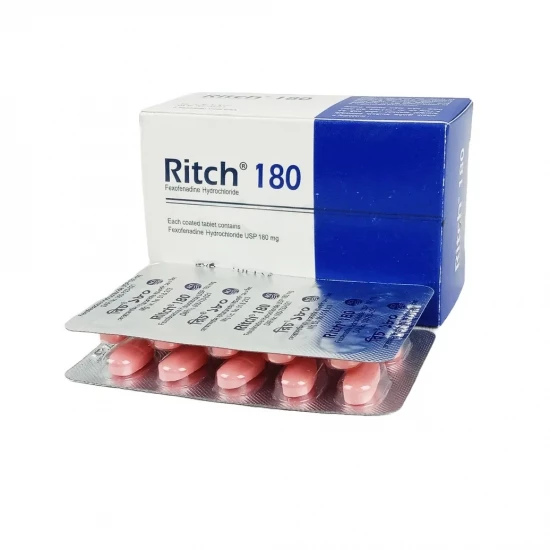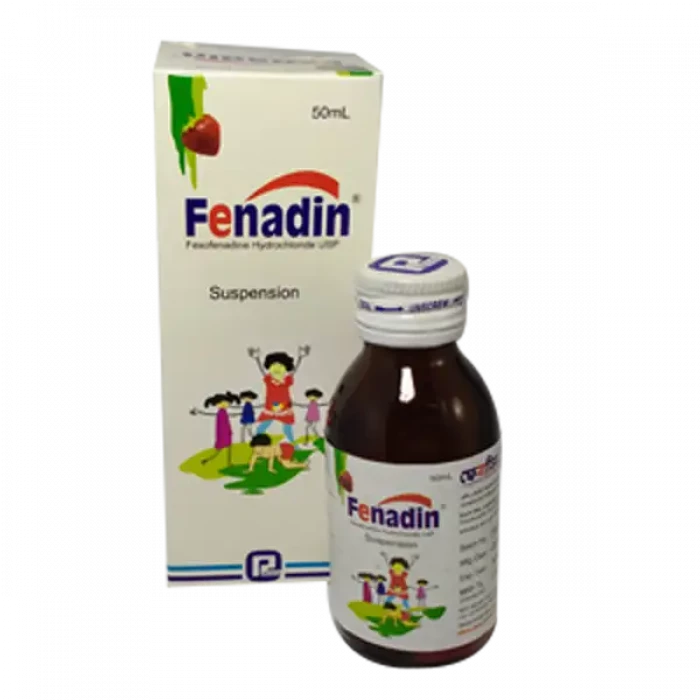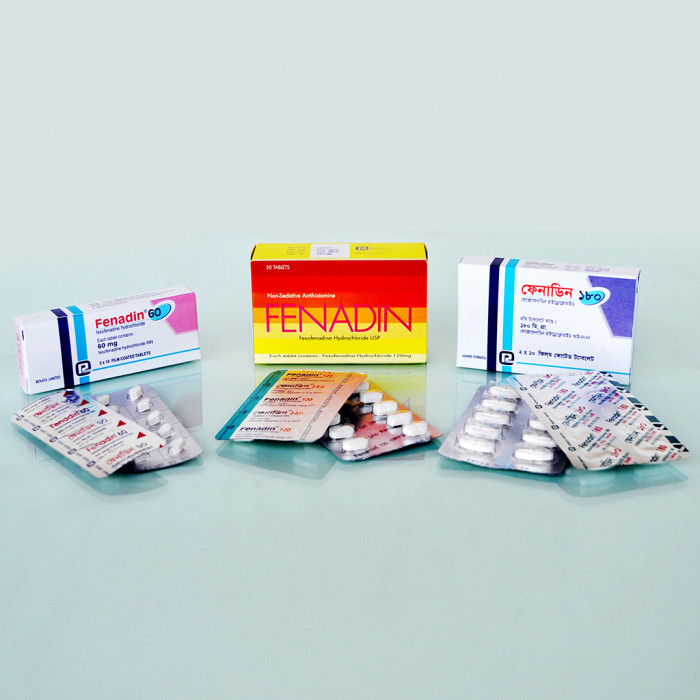
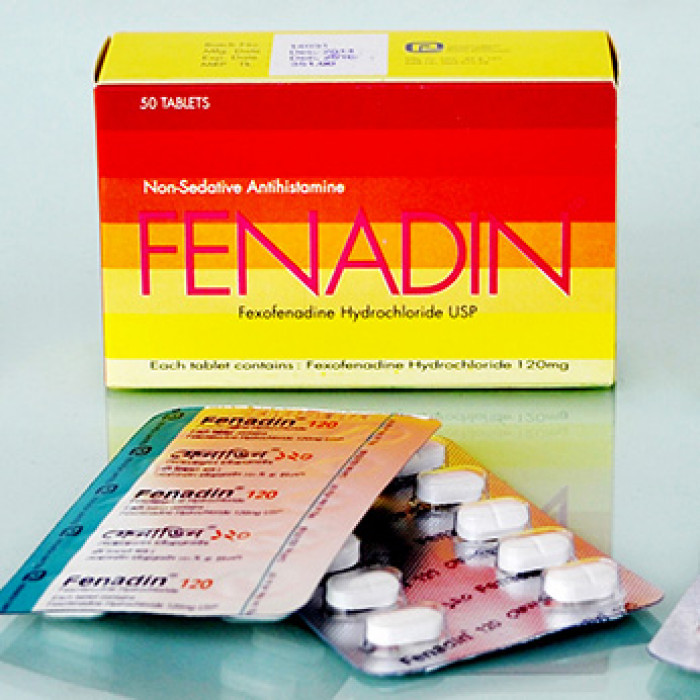
✔ 100% Authentic Product
👁️ Currently Viewing 11510
Fenadin 120mg 10pcs
Fenadin 120mg Tablet is an effective and potent anti-allergic medicine consisting of Fexofenadine. It is used to treat allergic symptoms like runny nose, watery eyes, sneezing, itching, hives, etc., associated with Rhinitis (hey fever) and Urticaria (skin allergy).
Discount
Price: ৳ 86
MRP:
৳
90
5%
Off

100% Genuine Products, Guaranteed

Safe & Secure Payments, Always

Fast, Secure & Efficient Delivery

Proper Packaging
 Cash on Delivery - All over Bangladesh
Cash on Delivery - All over Bangladesh Regular Delivery - 12-24 Hours, Dhaka City* Charge Tk.39-59
Regular Delivery - 12-24 Hours, Dhaka City* Charge Tk.39-59 Regular Delivery - 24-48 Hours, Other Cities* Charge Tk.99-110
Regular Delivery - 24-48 Hours, Other Cities* Charge Tk.99-110
 ফ্রি ডেলিভারিঃ - ৯৯৯ টাকা+ অর্ডারে, ঢাকা
শহরে
ফ্রি ডেলিভারিঃ - ৯৯৯ টাকা+ অর্ডারে, ঢাকা
শহরে ফ্রি ডেলিভারিঃ - ২৯৯৯ টাকা+ অর্ডারে, ঢাকার
বাহিরে
ফ্রি ডেলিভারিঃ - ২৯৯৯ টাকা+ অর্ডারে, ঢাকার
বাহিরে
100% Genuine Products, Guaranteed
Safe & Secure Payments, Always
Fast, Secure & Efficient Delivery
Proper Packaging
 Cash on Delivery - All over Bangladesh
Cash on Delivery - All over Bangladesh Regular Delivery - 12-24 Hours, Dhaka City* Charge Tk.39-59
Regular Delivery - 12-24 Hours, Dhaka City* Charge Tk.39-59 Regular Delivery - 24-48 Hours, Other Cities* Charge Tk.99-110
Regular Delivery - 24-48 Hours, Other Cities* Charge Tk.99-110 ফ্রি ডেলিভারিঃ - ৯৯৯ টাকা+ অর্ডারে, ঢাকা
শহরে
ফ্রি ডেলিভারিঃ - ৯৯৯ টাকা+ অর্ডারে, ঢাকা
শহরে ফ্রি ডেলিভারিঃ - ২৯৯৯ টাকা+ অর্ডারে, ঢাকার
বাহিরে
ফ্রি ডেলিভারিঃ - ২৯৯৯ টাকা+ অর্ডারে, ঢাকার
বাহিরে
✅ Description:
- Fenadin 120mgTablet is an antihistamine medication used to treat symptoms of seasonal allergies such as itchy throat, itchy eyes, sneezing, runny nose, itchy skin, and hives. It works by blocking the action of histamine, a chemical in the body that causes allergy symptoms.
- Before taking Fenadin 120mgTablet, it is important to inform your doctor about any allergies to medications, liver or kidney problems, pregnancy or plans to become pregnant, and the use of dietary supplements or herbal products.
- It is recommended to consult with your physician before taking Fenadin 120mgTablet along with other medications. When taking this medication, it should be swallowed with water and fruit juice should be avoided. Taking antioxidants should also be avoided. If you miss a dose, do not double the dose to make up for it.
- Consuming alcohol with Fenadin 120mgTablet can cause dizziness, and it may interfere with skin allergy tests. Elderly individuals may be more susceptible to its effects, so caution should be exercised. If you are pregnant or breastfeeding, it is important to consult your doctor before taking this medication.
- Common side effects of Fenadin 120mg Tablet include stomach upset, dizziness, and headache. Serious side effects such as rashes, swelling, and vomiting may occur, and it is advisable to consult a doctor if these side effects are experienced.
- It is important to take the medication as directed and not exceed the recommended dose. Store the medication at room temperature in a dry place. Avoid using other depressant medications, alcohol, or sleep-inducing medications unless approved by your prescriber.
- In case of overdose, symptoms such as dizziness, drowsiness, and dry mouth may occur. Hemodialysis is not effective for removing the medication from the body. High doses of up to 690 mg twice daily have been administered for one month without significant adverse effects. Supportive treatment is recommended.
- Please note that the information provided here is based on the salt content of the medicine, and the uses and effects may vary from person to person. It is advisable to consult an Allergist/Immunologist before using this medicine to ensure its appropriateness for your specific condition.
Safety Advices

Alcohol
UNSAFE
Avoid drinking alcohol while on Fenadin 120mg Tablet as it may make you feel sleepy and increase side effects.

Pregnancy
UNSAFE
Fenadin 120mg Tablet is generally not recommended for use in pregnant women unless considered clearly necessary. Consult your doctor before taking it.

Breastfeeding
UNSAFE
Fenadin 120mg Tablet is not recommended for use in breastfeeding women. Consult your doctor for advice.

Driving
CAUTION
Do not drive or operate machines if Fenadin 120mg Tablet makes you dizzy or sleepy. Consult your doctor before taking Fenadin 120mg Tablet

Kidney
CAUTION
Fenadin 120mg Tablet should be used with caution in patients with kidney problems. Consult your doctor before taking it.

Liver
CAUTION
Fenadin 120mg Tablet should be used with caution in patients with liver problems. Consult your doctor before taking it.
✔️ Uses of Fenadin 120mg Tablet
- Allergic Rhinitis
- Chronic Utricaria
✔️ How does Fenadin 120mg Tablet work?
Fenadin 120mg Tablet blocks the release of the natural substance histamine responsible for various allergic conditions. Thus, helps relieve symptoms of allergic conditions.
✔️ Side Effects of Fenadin 120mg Tablet
- Vomiting
- Headache
- Cough
- Diarrhea
- Painful Menstruation
- Pain In The Legs
- Redness Of Skin
- Swelling Of Face, Lips, Eyelids, Tongue, Hands And Feet
- Difficulty In Breathing
- Difficulty In Swallowing
- Dysmenorrhea
- Nausea
- Dyspepsia
- Viral Infections
✔️ Quick Suggestions:
- Fenadin 120 is an antihistaminic medication that is effective in treating allergy symptoms such as itching, swelling, and rashes by blocking the effects of histamine in the body.
- One advantage of Fenadin 120 is that it is less likely to cause drowsiness compared to other similar medications.
- When taking Fenadin 120, it is important to avoid consuming fruit juices like apple, orange, or grapefruit, as they can reduce the effectiveness of the drug.
- Ginger, which contains anti-inflammatory compounds, can help relax airway membranes and potentially reduce coughing. Drinking fluids at room temperature can also provide relief for symptoms like cough, runny nose, and sneezing.
- Managing stress is crucial for a healthy immune system. Engaging in regular exercise, meditation, deep breathing, and progressive muscle relaxation techniques can help reduce stress levels.
- Getting adequate sleep is important for maintaining overall health and immune function. Aim for 7-9 hours of sleep each night.
- To minimize the risk of allergies, it is advisable to avoid contact with known allergens such as pollen and dust. Additionally, be mindful of any food items that may cause allergies specific to you.
- Maintaining personal hygiene and keeping your surroundings clean can help prevent the spread of allergens and other pathogens.
- Nausea may be a possible side effect of Fenadin 120. It is recommended to stick to simple meals and avoid consuming rich or spicy foods that may worsen nausea symptoms.
- If you need to take antacids, it is best to do so at least 30 minutes before or after taking Fenadin 120. Antacids can interfere with the absorption of the medication, making it less effective.
- Remember to consult with your doctor or healthcare provider for personalized advice regarding the use of Fenadin 120 and to discuss any specific concerns or questions you may have.
✔️ Indication
Used in adults and children (aged above 12 years) to provide:
- Relief from the symptoms of hay fever (seasonal allergic rhinitis)
- Relief from the symptoms of chronic idiopathic urticaria
✔️ Pharmacology
Fexofenadine hydrochloride is an antihistamine that specifically blocks peripheral H1 receptors in the body. It is rapidly absorbed after oral administration and reaches its maximum concentration in the blood within 2 to 3 hours. Unlike some other antihistamines, fexofenadine has limited penetration across the blood-brain barrier, which means it has less sedative or drowsy effects compared to other antihistamines. This makes it a preferred choice for individuals who want relief from allergy symptoms without experiencing significant drowsiness.
✔️ Dosage & Administration of Fenadin 120mg Tablet
The recommended administration of Fexofenadine Hydrochloride is as follows:
- It should be taken on an empty stomach.
- It is advised to take it before meals.
- Avoid taking it with fruit juice, as it may affect the absorption of the medication.
The recommended adult doses for different conditions are:
- Allergic rhinitis: 120 mg once daily or 60 mg twice daily.
- Urticaria: 180 mg once daily.
For children, the recommended doses are:
- 2-12 years (tablet formulation): 30 mg (1 spoonful) or 5 ml twice daily.
- 6 months-2 years (tablet formulation): 15 mg (1/2 spoonful) or 2.5 ml twice daily.
12 years (tablet formulation): 60 mg twice daily or 180 mg once daily.
- 6-12 years (orally disintegrating tablet formulation): 30 mg twice daily.
In patients with renal impairment:
- Adults: Initially, 60 mg once daily.
- Children: 6 months-2 years: 15 mg once daily, and 2-11 years: 30 mg once daily.
12 years: 60 mg once daily, initially.
It's important to follow the dosage instructions provided by the healthcare professional or as indicated on the medication packaging. The dosing may vary depending on the individual's age, condition, and renal function.
✔️ Interaction
Fenadin 120mg Tablet can interact with several medications, and it is important to inform your doctor about all the medications you are taking to avoid any potential drug interactions. Here are some notable drug interactions:
Midodrine (used to treat low blood pressure): Fenadin 120mg Tablet 10's may enhance the effects of midodrine, leading to increased blood pressure. Close monitoring is necessary if these medications are used together.
Ketoconazole (antifungal medication): Ketoconazole may increase the levels of Fenadin 120mg Tablet in the body. Your doctor may need to adjust the dosage accordingly.
Erythromycin and rifampicin (antibiotics): These antibiotics may affect the metabolism of Fenadin 120mg Tablet, potentially altering its effectiveness. Your doctor may need to monitor your response to treatment or adjust the dosage if necessary.
Ritonavir and lopinavir (medications used to treat HIV infection): These medications may increase the levels of Fenadin 120mg Tablet in the body, leading to an increased risk of side effects. Close monitoring is necessary if these medications are used together.
Theophylline (respiratory disease medicine): Theophylline levels may increase when used concomitantly with Fenadin 120mg Tablet 10's. Your doctor may need to adjust the dosage of theophylline.
Pseudoephedrine (decongestant): Pseudoephedrine may increase the side effects of Fenadin 120mg Tablet 10's, such as increased heart rate or blood pressure. Caution is advised when using these medications together.
Ritonavir (anti-HIV drug): Ritonavir may increase the levels of Fenadin 120mg Tablet 10's in the body. Your doctor may need to monitor your response to treatment or adjust the dosage if necessary.
Indigestion remedies containing aluminum or magnesium: These remedies may decrease the absorption of Fenadin 120mg Tablet 10's in the body. It is advisable to separate the administration of these medications by a few hours.
Regarding drug-food interactions, consuming large amounts of alcohol and certain fruit juices (grapefruit, orange, and apple) may decrease the levels of Fenadin 120mg Tablet 10's in your body, potentially reducing its effectiveness.
Fenadin 120mg Tablet 10's is contraindicated in individuals with liver or kidney disease, heart problems, and epilepsy (fits). It is important to inform your doctor about these conditions before starting Fenadin 120mg Tablet 10's to ensure its safety and appropriateness for your situation.
Always consult your doctor or healthcare provider for personalized advice regarding drug interactions, including the specific medications you are taking and your medical history.
✔️ Contraindications
If you are allergic to fexofenadine or any other ingredients of the Fenadin 120mg Tablet
✔️ Pregnancy & Lactation
Patients with a history of cardiovascular disease should be cautious when using antihistamines, including Fenadin 120mg Tablet 10's, as they have been associated with adverse reactions such as tachycardia (rapid heart rate) and palpitations. It is important to discuss your medical history with your doctor before taking Fenadin 120mg Tablet 10's to ensure its suitability and safety for your condition.
In general, Fenadin 120mg Tablet 10's is not typically recommended during pregnancy and breastfeeding. However, the decision to use this medication during pregnancy or while breastfeeding should be made after considering the potential benefits and risks. It is crucial to have a discussion with your doctor who will evaluate your specific situation, taking into account the stage of pregnancy, the reasons for using Fenadin 120mg Tablet 10's, and any potential risks to the baby.
If you have a history of kidney or liver disease, or if you are dealing with a severe illness, it is important to inform your doctor. Depending on the condition of your disease, your doctor may need to adjust the dosage or consider alternative treatment options.
Always follow your doctor's advice and instructions regarding the use of Fenadin 120mg Tablet 10's. They are the best person to assess your individual circumstances and provide appropriate guidance.
✔️ Precautions & Warnings
Patients with a history of cardiovascular disease should be cautious when using antihistamines, including Fenadin 120mg Tablet 10's, as they have been associated with adverse reactions such as tachycardia (rapid heart rate) and palpitations. It is important to discuss your medical history with your doctor before taking Fenadin 120mg Tablet 10's to ensure its suitability and safety for your condition.
In general, Fenadin 120mg Tablet 10's is not typically recommended during pregnancy and breastfeeding. However, the decision to use this medication during pregnancy or while breastfeeding should be made after considering the potential benefits and risks. It is crucial to have a discussion with your doctor who will evaluate your specific situation, taking into account the stage of pregnancy, the reasons for using Fenadin 120mg Tablet 10's, and any potential risks to the baby.
If you have a history of kidney or liver disease, or if you are dealing with a severe illness, it is important to inform your doctor. Depending on the condition of your disease, your doctor may need to adjust the dosage or consider alternative treatment options.
Always follow your doctor's advice and instructions regarding the use of Fenadin 120mg Tablet 10's. They are the best person to assess your individual circumstances and provide appropriate guidance.
✔️ Short Description
Store medicines at room temperature, away from heat and direct light. Do not freeze medicines unless required by package insert. Keep medicines away from children and pets.
⚠️Disclaimer:
At ePharma, we’re committed to providing accurate and accessible health information. However, all content is intended for informational purposes only and should not replace medical advice from a qualified physician. Please consult your healthcare provider for personalized guidance. We aim to support, not substitute, the doctor-patient relationship.




